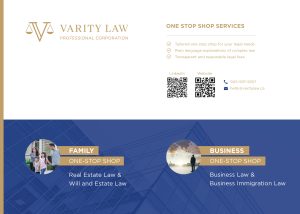What is the non-resident speculation tax (NRST) and why should I care about it?
Since October 25, 2022, the NRST is a 25% tax that is charged on all purchases of residential properties located anywhere in Ontario, but only if the purchaser is a “foreign national” (not a citizen or permanent resident of Canada) or is a foreign corporation (a corporation registered outside of Canada).
When calculating the NRST, the total tax payable is based on the sale price of the property, not including land transfer taxes or any other fees. So a $1,000,000.00 house would have $250,000.00 in NRST – in addition to the normal land transfer tax the purchasers need to pay ($16,475.00). This additional tax is paid at the time the property is transferred into the foreign national’s name and is in addition to any applicable Land Transfer Taxes.

Case Study Examples:
James, a citizen of Australia, moves to Canada under a study permit.
Scenario #1: James Buys a Property on his Own With No Other Purchasers
James signs an agreement of purchase and sale for one million dollars ($1,000,000.00).
In this case, James would pay $250,000.000 in NRST, as he is a foreign national purchasing a single unit residential property in Ontario. While there are exemptions to the NRST, none exist in this scenario.
Scenario #2: Joint Purchase of Property by One Foreign National and One or More Canadian Citizens
James purchases a property with 2 Canadian citizens, Linda and Carl, and one permanent resident, Frank. The purchase price is $1,000,000.00. James is not married to any other purchasers. Normally, the 3 Canadian citizens would not have to pay NRST on the purchase of residential land. However, because they are purchasing the property with James and the NRST is based on the full purchase price, the total NRST will still be 25% of the fill $1,000,000.00, which would be $250,000.00.
If Linda, Carl and Frank purchase the property without James, they will pay $0 in NRST, but by including James on the purchase, they are now subject to the full NRST.
Scenario #3: Joint Purchase of Property by One Foreign National and Their Spouse, Who is a Canadian Citizen or Permanent Resident
James is still in Canada on a study permit, but he has recently married Jane, a Canadian Citizen. They purchase a residential property in Ottawa for $1,000,000.00.
In this case, James and Jane would pay $0 in NRST. While James contaminated the purchase for everyone in the previous scenario, there is an exemption for spouses. As such, as long as James and Jane both register as owners on the same transfer and declare that the property will be their primary residence, they will be exempt from NRST.

Scenario #4: Purchase of Mixed-Use Property: 50% of property is residential and 50% is Commercial
James purchases property that has a commercial garage and a residential dwelling. The commercial garage accounts for 50% of the value of the entire purchase. In this situation, only the value attributable to the residential property will attract the NRST.
This means that a purchase where half of the property value (not square footage) is for the residential land and the other half is for the commercial land would only attract the NRST on 50% of the purchase price. As such, a $1,000,000.00 purchase with 50% residential value would attract $125,000.00 in NRST.
It is important to note that there must be a 100% division between the residential and commercial areas. If a residential space is used for both commercial and residential uses, this exemption would not apply and the NRST would be applicable against the full $1,000,000.00 purchase price.
Scenario #5: Purchase by an Applicant for Permanent Residence who was Nominated by the Ontario Immigrant Nominee Program (OINP)
James is offered a job with ABC In. and is approved by the Ontario government through the OINP system. James signs the agreement of purchase and sale for a property for $1,000,000.00.
In this case, James will not be required to pay NRST if he a) has already applied for permanent residence as part of the OINP system, or b) swears to apply for permanent residence under the OINP system before the OINP approval certificate expires.
Scenario #6: Purchase of a Recreational Property, Like a Cottage?
James decides to purchase a seasonal cottage in Ontario for $1,000,000.00.
Unfortunately, NRST also applies to cottages and seasonal properties. As such, James would have to pay $250,000.00 for NRST. Also, if any exemptions above would have normally applied, they will not apply to the Recreational Property, unless it is the primary residence.
Scenario #7: Foreign National Buys Property and then Applies and Becomes a Permanent Resident
If James buys a property and becomes a Permanent Resident within 4 years, he can apply for a refund of the NRST. However, James must apply for the refund within 90 days of becoming a Permanent Resident.

Side Note on Foreign Investments
Please keep in mind, as of January 1, 2023, Canada will be instituting a 2-year ban on almost all foreign investment into residential properties. As such, while the NRST will continue to apply to some purchases of residential properties by foreign nationals who qualify for an exception to the ban, it will not apply to the purchase of investment properties by most foreign nationals, as those purchases will no longer be possible. Please watch for our upcoming article on the foreign investor ban for more information.
Conclusion
The lawyers at Varity Law Professional Corporation have the experience and skill to guide you through your property purchase. If you are purchasing a property as a foreign national and want a firm with experience and knowledge, we invite you to book a 1st free consultation here: https://calendly.com/sabrina-668/1stfreeconsult
Jonathan Thibert, the author, is an experienced lawyer at Varity Law.
This article provides general legal information and not specific legal advice. To obtain legal advice that would fit with your situation, please book a 1st free consultation with us.






